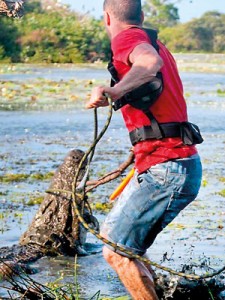How to catch a croc the humane way

Peter capturing a crocodile from a tank at the Yala National Park while on a visit to Sri Lanka last year
Trussed up tightly, it was dragged here and there and hammered mercilessly on the head with an axe. This was after its insides had been torn asunder, on swallowing the chicken-bait in which had been embedded a four-inch vicious hook shaped like an anchor.
This was in February 2012 and the agony of the massive, 15-foot Salty in the throes of death in Ragama is seared into the minds of all those who witnessed this horrible slaughter by the public after it became the prime suspect in the killing of a man who was cutting grass in the marshes.
With the clearing of the marshes and people venturing into animal territory, the human-crocodile conflict (HCC) is seeing an increase and it is to thwart such massacres of this keystone species surviving from the time of the dinosaurs, that a different scene will be enacted on April 17 and 18 at the Bellanwila Wildlife Sanctuary.
Launched soon after the New Year, it augurs well for these much-maligned creatures, for renowned crocodile expert Peter Prodromou will be in Sri Lanka to carry out a training programme on how to catch, restrain and transport the dangerous ones.
It will be ‘Operation Croc Rescue’ under which 50 personnel from the Department of Wildlife Conservation (DWC) will be trained in a joint programme organised under the leadership of Dr. Tharaka Prasad, DWC’s Director of Wildlife Health and Dr. Anslem de Silva, the Regional Chairman, Crocodile Specialist Group, South Asia and Iran, of the International Union for Conservation of Nature/Species Survival Commission (IUCN/SSC).
All the way from England, crocodile hunter nay rescuer Peter who runs safaripete.co.uk and his companion, Natasha Lewis, will be with the wildlife officials, day in, day out training them on how to capture dangerous crocodiles safely and humanely. Peter has honed his skills in this speciality in Florida, the United States of America, with alligators living in the wild.
“I’m very passionate about offering something that will be beneficial not only to crocodile conservation but also the communities that are facing challenges and living side by side with such predators,” he says in an e-mail, adding that he feels that the only way we can protect crocodiles is by also showing great respect to humans who are in conflict with them.
While the training in Sri Lanka will take place at Bellanwila today and tomorrow, it will continue from April 19 to 21 at the Giritale Wildlife Training Centre, with the practical aspects being interspersed with power-point presentations on crocodiles by Dr. de Silva.
“The training is done in a way to recreate realistic crocodile rescues, with the crocodiles struggling in nets, waterholes or even in confined rooms, without much space to deal with them,” said Dr. de Silva, explaining that while continuing the National Crocodile Status Survey, awareness programmes on the importance of these reptiles will also be held among villagers.
Where the HCC is high, meanwhile, Peter willsponsor and help instal two metal crocodile excluding enclosures, along with training for wildlife rangers in this arena as well.
Currently, the IUCN/SSC Crocodile Specialist Group which also includes Adrian Gabriel, Avishka Godahewa, Madhava Botheju and M.M. Mafas, is conducting a three-year survey of crocodiles in the Bolgoda aquatic ecosystem.
The two types of crocodiles found in Sri Lanka are the Saltwater crocodile (Crocodylus porosus) and the Mugger (Crocodylus palustris), both playing an important role in our eco-system. They are apex predators and as adult crocodiles have no natural predators in the eco-system.
The Saltwater crocodile, meanwhile, has been designated as one of the eight top vertebrates in Sri Lanka by the DWC. (KH)


